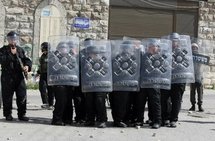
Israeli riot police (AFP/Jack Guez)
"The Quartet reaffirms that unilateral actions taken by either party cannot prejudge the outcome of negotiations and will not be recognized by the international community," it added in a statement.
Israel announced Tuesday during a landmark visit by US Vice President Joe Biden that 1,600 new settler homes would be built in predominantly Arab east Jerusalem.
The announcement triggered fury among Arab and Palestinian leaders, just as fledgling indirect talks appeared to have been coaxed back to life by the United States.
The Quartet said it had agreed to closely monitor developments in Jerusalem and to keep under consideration "additional steps that may be required to address the situation on the ground."
It reiterated that Arab-Israeli peace and the creation of "an independent, contiguous and viable state of Palestine is in the fundamental interests of the parties, of all states in the region, and of the international community."
It appealed to all concerned to back the urgent resumption of dialogue between the parties and to promote an atmosphere conducive to successful negotiations to resolve all outstanding issues of the Israeli-Palestinian conflict, including the status of Jerusalem.
The issue will be discussed at a ministerial session scheduled for March 19 in Moscow, to be attended by US Secretary of State Hillary Clinton.
The Palestinians see east Jerusalem as the capital of their promised state.
Israel, which seized east Jerusalem in the 1967 Six Day War and later annexed it in a move not recognised by the international community, considers the city its eternal and indivisible capital.
In an unusually sharp rebuke to a close ally, Clinton told Israeli Prime Minister Benjamin Netanyahu earlier Friday that Washington viewed the latest Israeli move as "a deeply negative signal about Israel's approach to the bilateral relationship."
The decision to build the homes in the ultra-Orthodox Ramat Shlomo neighbourhood was also criticized by both the European Union and the United Nations, which reiterated that all settlements are "illegal."
Russia called the move "unacceptable" and Britain said it would "give strength to those who argue that Israel is not serious about peace."
--------------------------------------------------------------------------------------
Israel announced Tuesday during a landmark visit by US Vice President Joe Biden that 1,600 new settler homes would be built in predominantly Arab east Jerusalem.
The announcement triggered fury among Arab and Palestinian leaders, just as fledgling indirect talks appeared to have been coaxed back to life by the United States.
The Quartet said it had agreed to closely monitor developments in Jerusalem and to keep under consideration "additional steps that may be required to address the situation on the ground."
It reiterated that Arab-Israeli peace and the creation of "an independent, contiguous and viable state of Palestine is in the fundamental interests of the parties, of all states in the region, and of the international community."
It appealed to all concerned to back the urgent resumption of dialogue between the parties and to promote an atmosphere conducive to successful negotiations to resolve all outstanding issues of the Israeli-Palestinian conflict, including the status of Jerusalem.
The issue will be discussed at a ministerial session scheduled for March 19 in Moscow, to be attended by US Secretary of State Hillary Clinton.
The Palestinians see east Jerusalem as the capital of their promised state.
Israel, which seized east Jerusalem in the 1967 Six Day War and later annexed it in a move not recognised by the international community, considers the city its eternal and indivisible capital.
In an unusually sharp rebuke to a close ally, Clinton told Israeli Prime Minister Benjamin Netanyahu earlier Friday that Washington viewed the latest Israeli move as "a deeply negative signal about Israel's approach to the bilateral relationship."
The decision to build the homes in the ultra-Orthodox Ramat Shlomo neighbourhood was also criticized by both the European Union and the United Nations, which reiterated that all settlements are "illegal."
Russia called the move "unacceptable" and Britain said it would "give strength to those who argue that Israel is not serious about peace."
--------------------------------------------------------------------------------------









 Home
Home Politics
Politics









